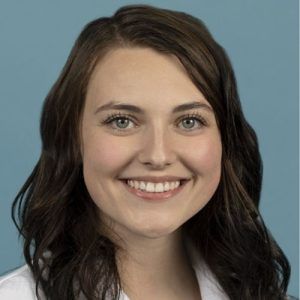Medical school at its core is four intense years of language courses, training future professionals to enter residency with an advanced comprehension of the complex linguistics, jargon, and terminology used to diagnose and treat illness, as well as support and maintain health for our patients. Teaching students how to also communicate about, and adequately research, the nutritional factors which prevent the very diseases we treat is imperative.
The discussion about how nutrition should be taught to medical students in the United States has been ongoing for many years.1 Student physicians receive many formal years of training about basic and clinical biological sciences as they pertain to human health. However, the debate about if, and when, medical students should study nutrition widely varies. Yet, there is substantial data to support the importance of nutrition, as well as its vital nature within the field of medicine.
The NIH estimates that at least 45% of deaths due to chronic illness each year are related to overconsumption of processed foods and inadequate intake of vital vitamins and nutrients.2 Beyond this, there is strong evidence for whole food plant-based nutrition (WFPBN) being both a treatment and prevention for at least six of the top 10 causes of death in the United States. These include heart disease,3 a variety of malignancies,4 cardiovascular disease (CVD),5 diabetes,6 dementia,7 and kidney disease.8 In addition to mortality benefits for these chronic diagnoses, WFPBN plays a significant role in reversing obesity and its related cardiometabolic disorders such as hyperlipidemia and hypertension.9
Establishing the discussion about nutrition relevance naturally prompts the question if these data should be a prominent part of a medical school education. There is increasing evidence and literature demonstrating that practicing physicians are hesitant to provide education for patients about nutrition. Vetter et al. published a study in 2008 among internal medicine resident doctors and 77% expressed the belief that nutrition assessment was a necessary component in primary care. Another 94% confirmed it was the duty of a physician to direct this education, but only 14% believed they personally had adequate training to provide it.10 These findings were similarly demonstrated through the SIS International Research Study among attending primary care physicians where only 15% reported feeling “totally prepared” to offer specific nutrition guidance to their patients.11 Furthermore, a study done in 2019 among medical residents, cardiology fellows, and faculty in Internal Medicine and Cardiology at a single healthcare center provided additional evidence to this topic. Of 248 physicians, 78.4% agreed that additional training in nutrition would allow them to provide better clinical care because, within their practices, pharmacologic and surgical interventions were more common referrals (70% and 86%, respectively) than lifestyle interventions (43% for diet, 50% for physical activity).12
Gaps in knowledge about disease prevention and specific dietary counseling largely stem from inadequate education throughout medical school and residency. Although some actively seek out this type of training, student physicians receive minimal preparation for understanding and teaching pillars of lifestyle medicine and factors for disease prevention.3 The level of nutrition training also significantly varies across medical schools without standard requirements or education models. Overall, this is harmful to the standard of care patients can ultimately receive because schools are not translating the most evidence-based knowledge to students or equipping them with the tools to evolve with the science.
The top five longest-living populations in the world have long known that foods grown from the earth preserve quality of life.13 The academic world is now translating this knowledge into a prescription for disease prevention and reversal. When it comes to nutrition, the unequivocal agreement is that the superior diet is one rich in fruits, vegetables, grains, whole grains, nuts and seeds, and low in ultra-processed foods. To label the most evidence-based diet for prevention of disease is one predominantly made of whole-food plants (WFPBN).4 Red meat, poultry, dairy products, and ultra-processed foods are minimally consumed or in some cases avoided entirely in this style of eating. Yet, there is still little to no education for student physicians in the United States about general nutrition or utilizing this specific evidence-based eating pattern for disease prevention and reversal.14 However, medical schools are starting to emerge with optional and sometimes even mandatory courses on culinary medicine such as “Health meets Food,”15 the science of food nutrition, and even plant-based nutritional interventions.14 This year, as a medical student, I decided to ask my peers what they thought about our nutrition education. I developed a survey and distributed it to peers around the country using social media and was able to receive data points from 675 students, across 82% of medical schools in the United States. While data is preliminary, as of 2023 most schools are still not requiring more than two hours of nutrition education across all four years. Education that is occurring and being tested on tends to revolve around vitamin deficiencies including B1, B6, thiamine, B12 and folate. Yet, students report not being taught about the details of how dietary and animal cholesterol leads to cardiovascular, malignant, and metabolic disease. Students also report very little instruction on basic nutrition science, how to research facts within the field of nutrition, or how to educate a patient about their diet and lifestyle. Throughout this year, I plan to share the details of nutrition education in the United States as of 2023, but as for right now, we stand in a place of knowledge without a plan for dissemination. The data is not unclear about what our diets should predominately be comprised of and the ultra-processed foods we should limit. The limitations at present are how we teach medical students to be fluent in the language of preventative medicine, in addition to the knowledge we provide them about clinical diagnostics and therapeutic medicine. Students should, at minimum, graduate from medical school with an understanding of whole food plant-based nutrition, ultra-processed foods, eating disorders, behavior change, and motivational interviewing. This starts with understanding where our baseline education is at, engaging stakeholders within the medical field, and creating standardized principles to incorporate into the curriculum.
References
- Bassin SR, Al-Nimr RI, Allen K, Ogrinc G. The state of nutrition in medical education in the United States. Nutr Rev. 2020;78(9):764-780. doi:10.1093/nutrit/nuz100
- Micha R, Peñalvo JL, Cudhea F, Imamura F, Rehm CD, Mozaffarian D. Association Between Dietary Factors and Mortality From Heart Disease, Stroke, and Type 2 Diabetes in the United States. JAMA. 2017;317(9):912. doi:10.1001/jama.2017.0947
- Devries S, Agatston A, Aggarwal M, et al. A Deficiency of Nutrition Education and Practice in Cardiology. Am J Med. 2017;130(11):1298-1305. doi:10.1016/j.amjmed.2017.04.043
- Tuso PJ, Ismail MH, Ha BP, Bartolotto C. Nutritional Update for Physicians: Plant-Based Diets. Perm J. 2013;17(2):61-66. doi:10.7812/TPP/12-085
- Barnard ND, Cohen J, Jenkins DJA, et al. A Low-Fat Vegan Diet Improves Glycemic Control and Cardiovascular Risk Factors in a Randomized Clinical Trial in Individuals With Type 2 Diabetes. Diabetes Care. 2006;29(8):1777-1783. doi:10.2337/dc06-0606
- Vang A, Singh PN, Lee JW, Haddad EH, Brinegar CH. Meats, Processed Meats, Obesity, Weight Gain and Occurrence of Diabetes among Adults: Findings from Adventist Health Studies. Ann Nutr Metab. 2008;52(2):96-104. doi:10.1159/000121365
- Lin MN, Chiu TH, Chang CE, Lin MN. THE IMPACT OF A PLANT-BASED DIETARY PATTERN ON DEMENTIA RISK: A PROSPECTIVE COHORT STUDY. Innov Aging. 2019;3(Supplement_1):S734-S734. doi:10.1093/geroni/igz038.2691
- Khan MA, Kassianos AJ, Hoy WE, Alam AK, Healy HG, Gobe GC. Promoting Plant-Based Therapies for Chronic Kidney Disease. J Evid Based Integr Med. 2022;27:2515690X2210796. doi:10.1177/2515690X221079688
- Remde A, DeTurk SN, Almardini A, Steiner L, Wojda T. Plant-predominant eating patterns – how effective are they for treating obesity and related cardiometabolic health outcomes? – a systematic review. Nutr Rev. 2022;80(5):1094-1104. doi:10.1093/nutrit/nuab060
- Vetter ML, Herring SJ, Sood M, Shah NR, Kalet AL. What Do Resident Physicians Know about Nutrition? An Evaluation of Attitudes, Self-Perceived Proficiency and Knowledge. J Am Coll Nutr. 2008;27(2):287-298. doi:10.1080/07315724.2008.10719702
- Keevican M. Poll: Most doctors want to discuss nutrition with patients but feel unprepared. https://www.pcrm.org/news/news-releases/poll-most-doctors-want-discuss-nutrition-patients-feel-unprepared.
- Harkin N, Johnston E, Mathews T, et al. Physicians’ Dietary Knowledge, Attitudes, and Counseling Practices: The Experience of a Single Health Care Center at Changing the Landscape for Dietary Education. Am J Lifestyle Med. 2019;13(3):292-300. doi:10.1177/1559827618809934
- Buettner D, Skemp S. Blue Zones. Am J Lifestyle Med. 2016;10(5):318-321. doi:10.1177/1559827616637066
- Mulpuri L, Allen N, Lunde A, et al. Rooting for Wellness: An Initiative Introducing Plant-Based Nutrition to First Year Medical Students. International Journal of Disease Reversal and Prevention. 2021;3(2). doi:10.22230/ijdrp.2021v3n2a283
- Health Meets Food. https://culinarymedicine.org/ 2023. Health Meets Food.








